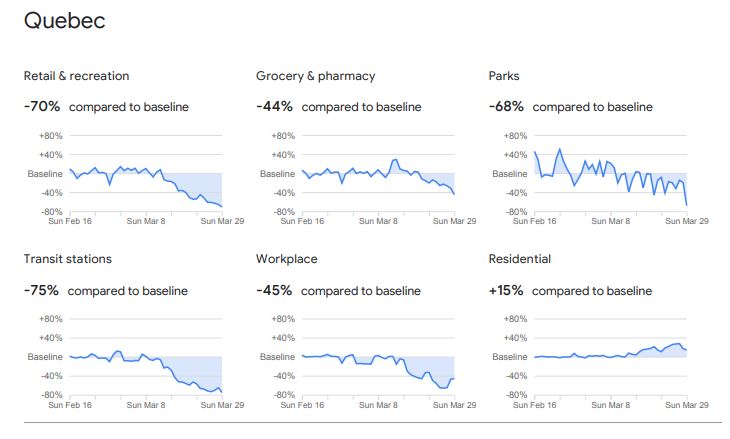In mid-March, Canada started to shut down in response to the new coronavirus.

It was visible all around us, as schools and offices emptied.
And it was also visible to Google, as location data sent by our phones showed a quick and profound change to our way of life.
Starting in about the second week in March, Canadians’ phones started spending less time in workplaces, on transit and in retail stores, and more time at home, our phones told Google.
The data showed that we also started shopping much less than normal. The reduction was about 60 per cent for destinations like restaurants and movie theatres, but only about 35 per cent for grocery stores and pharmacies.
“It’s less appealing than before to go grocery shopping,” says Dalhousie University professor Sylvain Charlebois. “Most grocery stores, especially during peak hours, you have to wait outside. You go in, and you feel that pressure of doing as much as you can in an allotted time.”

“Because of lineups, because of what’s been happening with online grocery shopping, people are actually forced to plan. If you have to plan, you don’t have to show up to the grocery store as often.”
Restaurants have been only allowed to serve customers takeout food in much of the country. To the extent that people use that option, they — and their phones — are spending much less time in restaurants than if they sat down for a meal.
“You show up at the counter, you’re trying to physically distance yourself from everyone else, and you want to get out as soon as possible. You’re not going to have a chat or anything like that. You’re just going to leave.”
Data in Google’s reports come from users who enabled Google’s “Location History” feature on their devices. The company said it adopted technical measures to ensure that no individual could be identified.

Get weekly health news
Google cautions that the accuracy of location tracking and their ability to put places into categories (like knowing that the place your phone is in is a grocery store) varies from region to region, so the company discourages using the data to compare countries with each other.
The data shows Canadians spending 16 per cent less time in parks than they did in mid-February, but this data is harder to interpret.
The coronavirus has changed how Canadians use outdoor space, but in contradictory ways.
Some provinces, like Nova Scotia, have shut down parks entirely, while some cities have left them open as outdoor space, while closing features such as playgrounds.
On the other hand, public health officials say it’s fine to take walks outside, so long as people practise social distancing from people they don’t live with. And with many other outlets for spare energy closed off, there isn’t a whole lot else to do.
Also, the weather is much more inviting than it was in mid-February, confusing the data somewhat.
Here’s how patterns of daily life have changed in Quebec, at least so far the hardest-hit province:
On a global scale, the analysis of location data from billions of Google users’ phones is the largest public dataset available to help health authorities assess if people are abiding with shelter-in-place and similar orders issued across the world to rein in the virus.
The company released reports for 131 countries, including Canada, with charts that compare traffic from Feb. 16 to March 29 to retail and recreational venues, train and bus stations, grocery stores and workplaces with a five-week period earlier this year.
Google said it published the reports to avoid any confusion about what it was providing to authorities, given the global debate that has emerged about balancing privacy-invasive location tracking with the need to prevent further outbreaks.
The data often correlated with the severity of outbreaks and the harshness and breadth of orders imposed by governments.
Italy and Spain, two of the hardest-hit countries, both saw visits to retail and recreation locations such as restaurants and movie theaters plunge 94 per cent. The United Kingdom, France and Philippines had declines of more than 80 per cent while India, which went into a sudden 21-day lockdown on March 25, was also notable at 77 per cent.

In the United States, where state responses have varied greatly, and in Australia, where good weather initially prompted many people to go the beach before social distancing measures were ratcheted up, the drops were less steep at under 50 per cent.
In contrast, in Japan and Sweden, where authorities have not imposed harsh restrictions, visits to retail and recreation sites fell by roughly only a quarter. While in South Korea, which has successfully contained a large outbreak through aggressive testing and contact tracing, the decline was just 19 per cent.
The data also underscores some challenges authorities have faced in keeping people apart. Grocery store visits surged in Singapore, the U.K. and elsewhere as travel restrictions were set to go into place.
The data also underscores how the mood of people around the world has shifted. In New Orleans, during its annual Mardi Gras celebrations Feb. 16-25, which has with hindsight been criticized for helping spread the virus, there were off-the-chart increases in traffic to transit stations, parks and businesses.
But three weeks later in Dublin, heart of the St. Patrick’s holiday celebrations, traffic was down at retail and recreational venues as the country ordered big events cancelled.

Google declined to comment on whether it has received any legal requests to share more detailed data to help with efforts to tackle the pandemic.
Facebook Inc., which like Google has billions of users, has shared location data with non-governmental researchers that are producing similar reports for authorities in several countries. But the social media giant has not published any findings.
With files from Reuters















Comments
Want to discuss? Please read our Commenting Policy first.